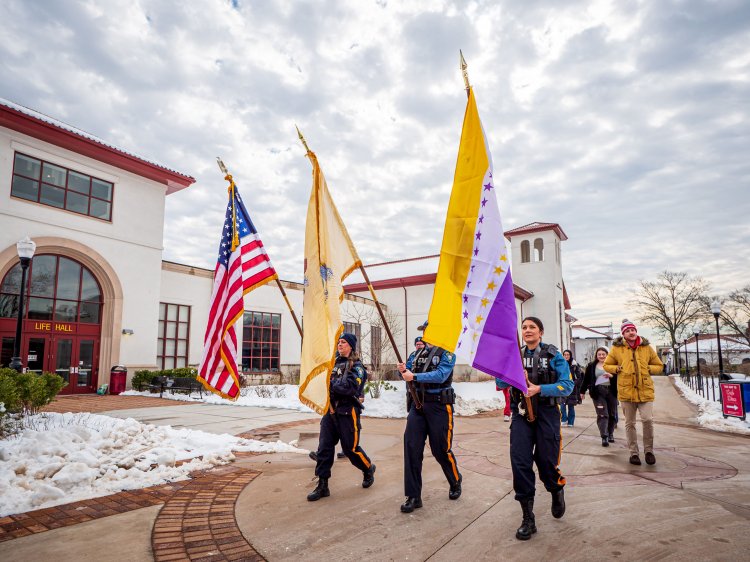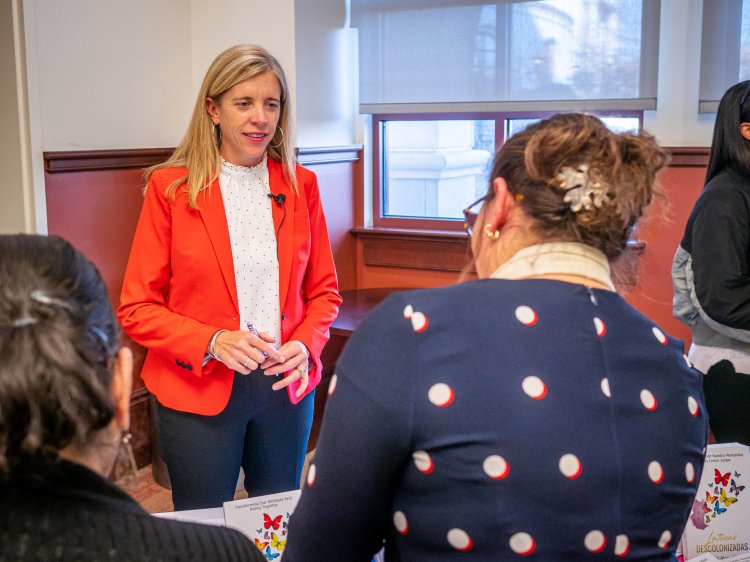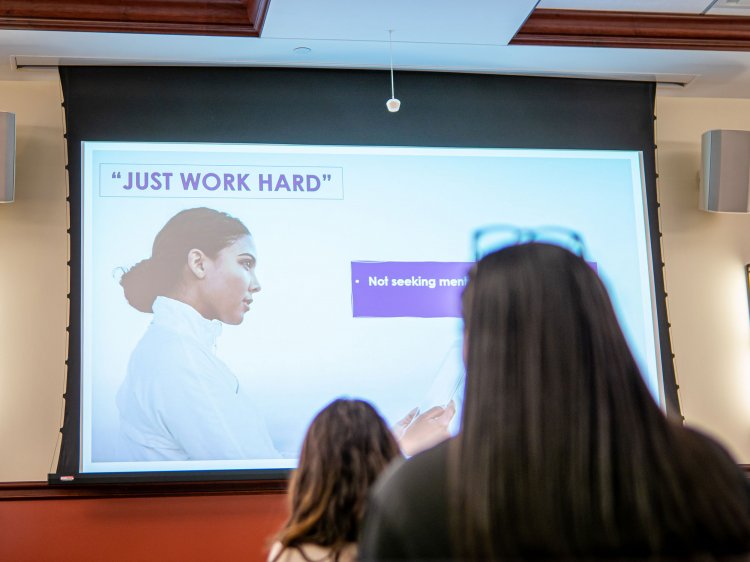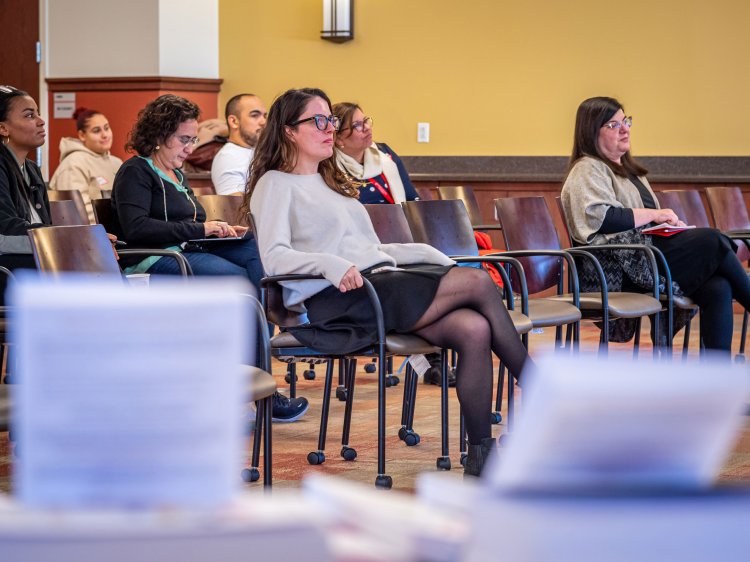Valeria Aloe | entrepreneur
Valeria Aloe | entrepreneur
As part of Women’s History Month events, author, speaker and entrepreneur Valeria Aloe spoke to Montclair State University’s students and staff at the Feliciano School of Business.
People who grew up hearing that they must work hard, be humble and thankful for what they have often don’t realize how those cultural messages help shape them and sometimes sabotage success, says author, speaker and entrepreneur Valeria Aloe.
“Ancestral ways of thinking influence our decisions and behaviors,” she says. As an example, Aloe shared her own story and struggle as an Argentinian immigrant working on an MBA at an Ivy League school and working in corporate America and how a cultural narrative she received from her father led her not only to work hard – but burn out. The messages she received were “Money comes with sacrifice. You need to sacrifice yourself to make money, and I follow that to the letter because I burnt out to make money.”
The part-time co-director of the Feliciano Center for Entrepreneurship & Innovation says she learned a tough but necessary lesson: “working really hard and sacrificing are not sustainable.”
Aloe’s presentation, “Rising Together: Breaking Through Our Cultural Limiting Mindsets to Succeed,” was sponsored by the Office for Hispanic Initiatives and held at the Feliciano School of Business. It was one of several events happening during Women’s History Month at Montclair State University, which kicked off with a flag-raising ceremony led by female police officers. All Femme Everything, a talent showcase in honor of the 2023 Women’s History Month theme designated by the National Women’s History Alliance, “Celebrating Women Who Tell Our Stories,” was held Thursday. It was co-sponsored by the Office for Social Justice and Diversity, Student Government Association, Daughta Speaks, The Brotherhood La Hermandad, and the Department of Theatre and Dance. The Future College Graduate Academy, including the Educational Opportunity Fund Program, an annual female and female-identified empowerment conference, is set for Friday at University Hall for female high school students in grades 10 through 12.
 Women’s History Month kicked off with a flag-raising ceremony and a procession across campus that included female University police officers.
Women’s History Month kicked off with a flag-raising ceremony and a procession across campus that included female University police officers.
During her talk, Aloe walked the audience through common cultural messages that may result in limiting beliefs and feelings of unworthiness. Messages of “just work hard and your hard work will get noticed” and “don’t rock the boat” often keep people from singing their own praises or speaking up for themselves when it comes to asking for pay raises or promotions, Aloe says.
“We say no to ourselves before someone else says no to us,” she says, “especially women.”
Aloe surveyed the audience, revealing that attendees were largely first-generation college students, first-generation in their profession and identified as Latina/o or Hispanic. When she polled them about behaviors that hold them back the most, two top reasons emerged: “I may say ‘yes’ too often to not ‘reject’ others” and “I feel uncomfortable talking about my success stories.” The latter was followed closely by: “I tend to remain silent when I have a different opinion.”
 Author and speaker Valeria Aloe chats with students after her presentation and book signing.
Author and speaker Valeria Aloe chats with students after her presentation and book signing.
The author of Uncolonized Latinas: Transforming Our Mindsets and Rising Together walked the audience through the “Latino paradox,” stating that in 2020, Latinos accounted for 52% of the U.S. population growth, numbered 62 million and contributed $2.6 trillion to the U.S. economy. “If we were a country, we would be the eighth largest economy in the world,” Aloe said, before adding that Latinos lag far behind in all metrics, resulting in leadership and wealth gaps that have remained largely unchanged since 1980. “We don’t just make less money, we have less wealth, and this also applies with very similar numbers to the Black community,” Aloe says.
The Latino “population is relevant and growing,” Aloe says. “We are extremely and increasingly powerful and growing and yet, we have not awakened to our power and influence, and we remain largely unseen and unappreciated – and that is the paradox.”
These beliefs can result in not owning our victories, bypassing growth opportunities, Aloe told the audience, adding that it is possible to “change mindsets and behaviors that we carry from our culture. We don’t need to wait for change to happen outside of us.”
She shared how to become aware of limiting beliefs and behaviors, how to reframe them and change inner dialogue to more positive self-talk and ultimately how to take action by taking micro steps upon which to build a sense of accomplishment. She asked for volunteers to share what steps they would take to tackle an issue they were facing.
 Author, speaker and entrepreneur Valeria Aloe shares some culturally limiting mindsets that people carry into adulthood.
Author, speaker and entrepreneur Valeria Aloe shares some culturally limiting mindsets that people carry into adulthood.
Jennifer Martinez, an Accounting major, shared that she wanted to stop procrastinating when it came to reading, studying and getting her school work done. Aloe challenged her to leave her book on her bed, as a reminder that she needed to read. Martinez agreed to do so, saying later that she found Aloe’s talk about cultural limiting beliefs helpful. “I can relate to them, all of them actually,” Martinez said after Aloe’s presentation.
While Aloe’s talk centered on culturally limiting beliefs among Latinos – as immigrants or children of immigrants – many of the lessons also resonated with non-Latinos in the audience.
“There’s so much that she talks about that applies to Latinas, of course, but to women in general,” says Liz Rich, executive director of the Feliciano Center for Entrepreneurship & Innovation. “You don’t question those beliefs because they’re so ingrained in your cellular data.”
Rich says she met Aloe during the 2020 Women’s Entrepreneurship Week and was “absolutely just blown away by her from the get-go. I thought that she was just such a kind, giving, wise person who just had so much to impart beyond just how to work in business spaces; she teaches you how to live in life spaces.”
 Associate Provost for Hispanic Initiatives and International Programs Katia Paz Goldfarb, right, and Executive Director of the Feliciano Center for Entrepreneurship & Innovation Liz Rich, third from right, and other audience members listen during author and speaker Valeria Aloe’s presentation. Her book titled Uncolonized Latinas: Transforming Our Mindsets and Rising Together is in the foreground.
Associate Provost for Hispanic Initiatives and International Programs Katia Paz Goldfarb, right, and Executive Director of the Feliciano Center for Entrepreneurship & Innovation Liz Rich, third from right, and other audience members listen during author and speaker Valeria Aloe’s presentation. Her book titled Uncolonized Latinas: Transforming Our Mindsets and Rising Together is in the foreground.
Story by Staff Writer Sylvia A. Martinez. Photos by John J. LaRosa.
Original source can be found here.

 Alerts Sign-up
Alerts Sign-up